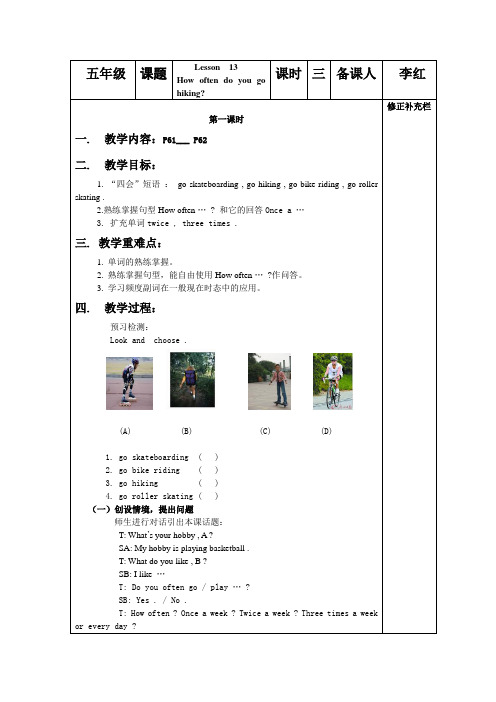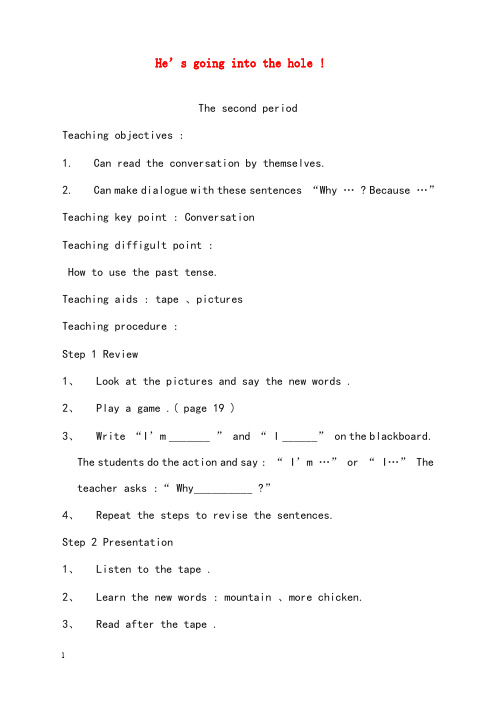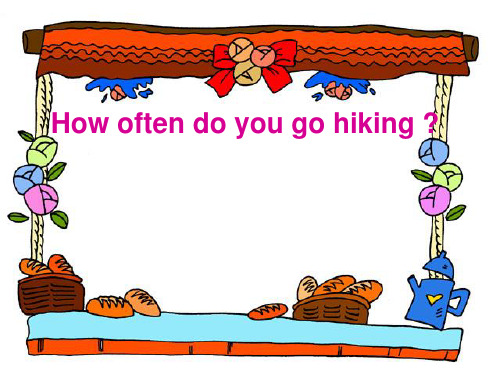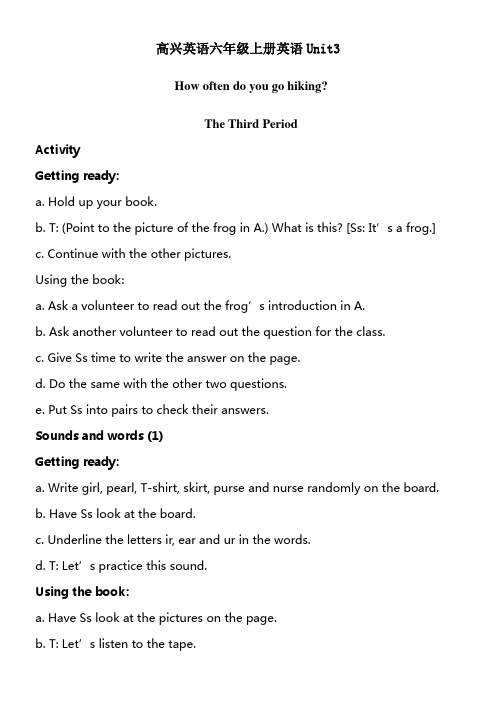LessonHowoftendoyougohiking陕旅版教案
- 格式:docx
- 大小:11.96 KB
- 文档页数:4


He’s going into the hole !The second periodTeaching objectives :1.Can read the conversation by themselves.2.Can make dialogue with these sentences “Why … ? Because …”Teaching key point : ConversationTeaching diffigult point :How to use the past tense.Teaching aids : tape 、picturesTeaching procedure :Step 1 Review1、Look at the pictures and say the new words .2、Play a game .( page 19 )3、Write “I’m _______ ” and “ I ______” on the blackboard.The students do the action and say : “ I’m …” or “ I…” The teacher asks :“ Why__________ ?”4、Repeat the steps to revise the sentences.Step 2 Presentation1、Listen to the tape .2、Learn the new words : mountain 、more chicken.3、Read after the tape .4、Practice the dialogue .Step 3 Practice1、Have Ss look at the pictures for A:Why is she upset ?Write “because ________” on the board .T : Point to the first picture , have the students answer . Continue with the other pictures in A.Play the tape for A, then pause .2、Repeat the procedures with the other three questions . Step 4 ExerciseDo sone exercise about the workbook.Step 5 HomeworkRetell “Conversation ”.Blackboard writing :3 He’s going into the hole !I’m _____________ .I ___________________.Why is she upset ?Because _______________ .教学后记:学生对于本课的单词巨型掌握得较好。




高兴英语六年级上册英语Unit3How often do you go hiking?The Third PeriodActivityGetting ready:a. Hold up your book.b. T: (Point to the picture of the frog in A.) What is this? [Ss: It’s a frog.]c. Continue with the other pictures.Using the book:a. Ask a volunteer to read out the frog’s introduction in A.b. Ask another volunteer to read out the question for the class.c. Give Ss time to write the answer on the page.d. Do the same with the other two questions.e. Put Ss into pairs to check their answers.Sounds and words (1)Getting ready:a. Write girl, pearl, T-shirt, skirt, purse and nurse randomly on the board.b. Have Ss look at the board.c. Underline the letters ir, ear and ur in the words.d. T: Let’s practice this sound.Using the book:a. Have Ss look at the pictures on the page.b. T: Let’s listen to the tape.c. Play the tape and have Ss point to each word as the tape says it.d. T: Let’s listen again and this time, repeat.e. Have Ss repeat after the tape.f. After enough practice, point to the pictures randomly and have Ss say the words.Sounds and words (2)Getting ready:a. Write girl, purple, purse, pearl, nurse, bird, skirt, word and shirt on the board.b. Have Ss underline the sound in common of these words. (girl, purple, purse, pearl, nurse, bird, skirt, word, shirt)Using the book:a. T: Let’s listen to the chant.b. Play the tape and have Ss point to each word as the tape says it.c. T: Let’s chant together.d. Play the tape again and have Ss practice chanting.e. Divide Ss into four groups.f. T: Let’s see who can chant better!g. Have each group chat in their own creative way.h. Choose a group with the best performance and explain why they win.教学跋文: 从本节课的情形反映,学生的阅读能力比较薄弱,明白得课文能力很差,对人称的转变,对句型的结构不睬解,须加大训练力度。
六年级上册英语How often do you gohiking 教学设计Book7《Unit 3 How often do you go hiking ? 》单元第二课时教学设计教学年级:六年级课题名称:《 Unit 3 How often do you go hiking ? 》教材版本:Friends with English 开心英语一、教学内容:versation and conversation (第二课时)二、教学目标1、语言知识目标:(1)进一步熟悉How often do you…?句型,能灵活地变换不同人称的表达方式和理解与运用wu等。
(2)能够熟练地运用wur times等来描述关于某个活动的频度,能够根据自己或他人的活动频率来写一写自己或他人的爱好,培养学生健康、有益的个人爱好。
2、语言技能目标:在情境和整体的语篇材料中,理解目标句型,并能从中获取信息,从而理解语篇, 及能运用本单元语言点进行简单的写作。
3、情感态度目标:(1)通过学习,树立学生学习英语的信心和提高用英语会话的兴趣。
(2)帮助学生树立良好兴趣或爱好的观念。
三、教学方法与教学策略:教学方法:本节课采用视听教学法,情景教学法、活动教学法、游戏教学法和任务型教学法。
以“言语交际为中心”,借助多媒体提供的多种资源,以听、读情境对话和故事为突破口,在课堂中灵活贯穿无意识记忆知识迁移法,让学生能够在老师有意识的指导下无意识的轻松识记知识。
辅助手段:(1)制作多媒体课件来辅助教学,形象、生动、真实的情景展现,为学生的学习提供了良好的基础。
(2)善于利用图片,让学生有系统的对知识进行归纳和运用。
(3)利用顺口溜让学生把所学的知识进行记忆,加深对知识的理解。
(4)教具:多媒体课件、图片、视频、课堂练习等。
四、教学重点和难点:教学重点:1、能让学生较熟练地掌握How often do you go …? 句型以及相关的回答。
(陕旅版)五年级英语下册教案Lesson 13 How often do you go hiking?其实,除了参加运动会,我们平常还有许多有益的户外活动。
你常进行什么样的户外活动?学习句型:How often do you go hiking? I go hiking once a week.这些句子用来描述你进行某项活动的频度如何。
学会词语:go skateboarding go bike riding go hiking go roller skating 小结频度副词在一般现在时态中的应用。
教学目的:1.会说会用这些句子:How often do you go hiking?I go hiking once a week.2.会说会用会写这些单词:go skateboarding go bike riding go hiking go roller skating3.学习频度副词在一般现在时态中的应用。
课前准备:1.教师准备一个课件,课件中四个孩子在一起闲谈,谈论它们各自喜欢的户外活动。
课件中的对话内容如句型词汇中所提供。
2.准备go skateboarding go bike riding go hiking go roller skating的单词卡片。
3.准备一些户外活动的图片如:野餐,爬山,钓鱼,骑自行车郊游,徒步旅行,放风筝,滑滑板,滑旱冰等。
4. 准备一些实物。
钓竿,背包,滑板,旱冰鞋,风筝等。
教学过程:热身(Warming up)师生进行对话引出本课话题:T: What’s your hobby,A?SA: My hobby is watching TV/playing computer games/…老师引导学生说出自己的喜好。
T:Do you like…,B? What’s your hobby? 老师在边展示图片边向学生B 提问What do you like ,B?SB: I like….老师把学生说出的活动的图片找出来,学生不会用英语说的话,老师可提供帮助。
(陕旅版)五年级英语下册教案
Lesson 13 How often do you go hiking
其实,除了参加运动会,我们平常还有许多有益的户外活动。
你常进行什么样的户
外活动学习句型:How often do you go hiking I go hiking once a week.这些句子
用来描述你进行某项活动的频度如何。
学会词语:go skateboarding go bike riding go hiking go roller skating 小结频度副词在一般现在时态中的应用。
教学目的:
1.会说会用这些句子:
How often do you go hiking
I go hiking once a week.
2.会说会用会写这些单词:
go skateboarding go bike riding go hiking go roller skating
3.学习频度副词在一般现在时态中的应用。
课前准备:
1.教师准备一个课件,课件中四个孩子在一起闲谈,谈论它们各自喜欢的户外活动。
课
件中的对话内容如句型词汇中所提供。
2.准备go skateboarding go bike riding go hiking go roller skating
的单词卡片。
3.准备一些户外活动的图片如:野餐,爬山,钓鱼,骑自行车郊游,徒步旅行,放风筝,滑滑板,滑旱冰等。
4. 准备一些实物。
钓竿,背包,滑板,旱冰鞋,风筝等。
教学过程:
热身(Warming up)
师生进行对话引出本课话题:
T: What’s your hobby,A
SA: My hobby is watching TV/playing computer games/…老师引导学生说出自己的
喜好。
T:Do you like…,B What’s your hobby 老师在边展示图片边向学生B 提问What do you like ,B
SB: I like….老师把学生说出的活动的图片找出来,学生不会用英语说的话,老师可
提供帮助。
T: Do you often go/play…
SB :Yes.No.
T:How often Once a week Twice a week Three times a week or every day
SB:老师帮助其回答。
2. 新课展示(New Presentation)
播放课件,展示本课话题:
Ben: What’s your hobby
David:I like hiking is my hobby. I go hiking with my friend on Saturday. Ben: How often do you go hiking
David: Once a week. What do you like
Ben: I like bike I always go bike riding after school.
Billy:I never ride bike to like roller skating. I often go roller skating in the afternoon.
Alice:But I like skateboarding. Sometimes I go skateboarding in the afternoon. 句型词汇学习:
1)Tomorrow is ’s go hiking.
hike 徒步旅行而 walk 是指一般的走路。
go doing去干什么,去做某项运动。
常见的短语有:
go fishing go swimmimg
go skating go hunting
Do you often go hiking
is my hobby.
2) How often do you go hiking
How often多久一次常用来对某种行为的频度进行提问。
For example
How often do you go to see your grandma
How often does he come home
How often do they go fishing
3) Once a week.一周一次。
对于频度的提问,常回答在单位时间里进行的次数是什么。
如:
Once a month. 一月一次
Twice a day. 一日两次
Three times a year. 一年三次
Six times a season. 一个季度六次
4)sometimes often usually always 均为频度副词,表示某一行为在一个单位时间里发生的次数有多少。
sometimes 有时 often 经常 usually通常 always 总是
而 never 是一个完全否定的副词,表示从来没有。
这些频度副词用于一般现在时态,常放在行为动词之前。
For example:
I sometimes go shopping with my mother on Sunday.
Do the students often have lunch at school
What do you usually do after work 下班后你常干什么
I usually do some sports . I often go bike riding. Sometimes I go roller skating. My father always rides his bike to work.
Mir Smith doesn’t like never goes swimming with Betty.
5)ride 骑常用的短语有:
ride a horse ride a bike go bike riding
6)roller 滚转的东西 go roller skating 去滑旱冰
go skateboarding 去滑滑板
Do you often go skateboarding
No, I go roller skating three times a week.
3. 巩固活动:
1)让学生根据表格中幼儿园孩子们一周的食谱,让用所学的频度副词完成句子:
Menu of this week
The children ________________________________ for breakfast.
The children ________________________________ for breakfast.
The children ______________________________________________.
They______________________________________ for lunch.
They______________________________________ for lunch.
They________________________________________________.
They________________________________________________.
______________________________________________ supper.
___________________________________________________.
___________________________________________________.
___________________________________________________.
2)小组活动:
每个同学先自己完成表格中要填写的内容,然后与自己的同伴互相问答:How often do you…
4.听录音学习对话:
Let’s listen to the dialogue,then answer the questions.
1)What day is tomorrow
(It’s Saturday.)
2)What would they do
(They would go hiking.)
3)How often does Mike go hiking
(About once a week.)
4)What about Tom
(He goes hiking once a week.)。